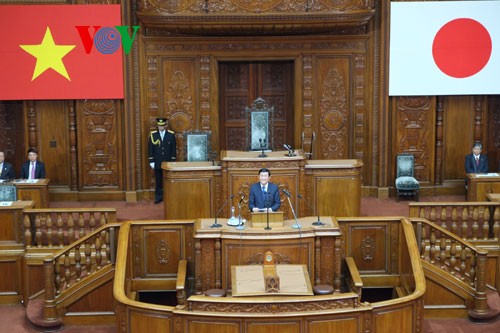(VOVworld) – President Truong Tan Sang addressed Japan’s Diet as part of his ongoing state visit to Japan. Themed “Reform and innovation to adapt to a changing world”, his message expressed a willingness to consolidate friendship and cooperation between Vietnam and Japan.
 |
He said that the establishment of the strategic partnership between Vietnam and Japan in 2009 had opened a new chapter in bilateral ties: “Japan has become one of Vietnam’s most important partners in its modernization and industrialization process. Vietnam has used Japan’s valuable ODA effectively. In a bid to restructure our growth model, we hope to receive more effective cooperation from Japan through the sharing of managerial experience, technology transfer, ODA, and increased investment in infrastructure projects, personnel training, support industries, post-harvest technology, agro-forestry, and aquaculture. Vietnam will continue to fine-tune its institutions and create the best possible conditions to attract Japanese investment. We hope that Japan will continue to help Vietnam to avoid the middle income trap and achieve its industrialization and modernization targets.”
President Sang said that in addition to economics, cooperation in the areas of culture, tourism, science and technology, and education has contributed to the strategic partnership between the two countries. He added that this relationship confirmed the truth that dialogue instead of confrontation, mutual respect and cooperation for mutual benefit are the best solution for every nation: “Vietnam believes that the security and development targets of each nation can be achieved only if they link their fate with that of the region and the world. In this spirit, in regard to maritime disputes, Vietnam remains consistent to the principle of peaceful solutions and international law including the 1982 UN Convention on the Law of the Sea, respecting each other’s independence, sovereignty and interests. All parties should exercise restraint, not to complicate the situation, or to use or threaten to use force. Vietnam and Japan have been cooperating effectively in important multilateral forums. Vietnam supports Japan’s bid for UN Security Council permanent membership, contributing to regional and global peace, stability, cooperation, and development. Vietnam is appreciative of Japan’s initiatives to promote joint cooperation for regional peace and stability including the Expanded ASEAN Maritime Forum (EAMF). The consolidation of the Japanese-Vietnamese Strategic Partnership has played an important role in supporting ASEAN to form a Community by 2015and enhance its central role in the regional structure. Vietnam will do its best to boost the ASEAN-Japan strategic partnership for a region of peace, stability, and prosperity.”
Earlier, President Sang met with President of the House of Representatives Bunmei Ibuki and President of the House of Councilors Masaaki Yamazaki. President Sang said he hoped that the two Japanese legislators would contribute to furthering cooperation between the two countries and the two legislative bodies in law making and supervision as well as in the exchanges of young parliamentarians.
President Sang had a working session with the Japan-Vietnam Friendship Parliamentary Alliance and received President of the Democratic Party of Japan Banri Kaieda, President of the Everyone’s Party Tanaka Watanabe, and President of the Japan International Cooperation Agency (JICA) Tanaka Akihito. He also received the President of the Japan Bank for International Cooperation (JBIC) and leaders from a number of major Japanese groups such as Daiwa Security, Mitsubishi, and the OGC Foundation.
While receiving President of the Communist Party of Japan Kazuo Shii, President Sang invited the party leaders to visit Vietnam. President Kazuo Shii expressed his hope for increased visits and more theoretical exchanges between their parties. President Sang also received former Japanese Prime Minister Iukio Hatoiama, President of the International Friendship Exchange Council (FEC) Chihiro Kanagawa, President of the Komei Party Nachuo Iamaguchi and leaders from the Fujitsu and SE groups.
During President Sang’s visit, Deputy Prime Minister and Foreign Minister Pham Binh Minh held talks with his Japanese counterpart Fumio Kishida, Minister of Education and Training Pham Vu Luan held talks with Japan’s Education Minister, and Minister of Planning and Investment Cao Duc Phat held talks with the President of Zenchu Organization a part of Japan’s Organic Agriculture Association.
President Sang the same day held talks with Japanese Prime Minister Shinzo Abe. They agreed to elevate bilateral ties to the level of in-depth strategic partnership for peace and prosperity in Asia. The two leaders agreed on major orientations and specific measures to develop bilateral relations in all areas. Prime Minister Abe said Japan is willing to support Vietnam in maritime legal disputes and continues to consider Vietnam an important partner in its ODA policy. The two sides agreed to continue cooperation in trade, investment and agriculture. They also discussed measures to bolster cooperation in human resource development, science and technology and healthcare. Japan committed to helping Vietnam upgrade a number of key universities and vocational training schools to international standards. President Sang hailed Japan’s proposal to establish mechanisms on cultural and people-to-people exchanges to consolidate friendship and mutual understanding between the two peoples. The two leaders agreed to further cooperation in regional and global organizations and forums, contributing to maintaining peace, stability, cooperation, development, maritime safety and security in the region based on international law and the 1982 UN Convention on the Law of the Sea.
After talks, they signed a joint statement on extensive strategic partnership for peace and prosperity in Asia and witnessed the signing of a number of cooperative agreements between the two countries. These included a preferential loan package worth 120 billion Yens for the 2012 fiscal year to build the transnational highway, develop the Hai Phong international gateway seaport, and build the Thai Binh thermal power plant and a transmission line. Prime Minister Abe held a banquet for President Sang and his entourage later in the day.